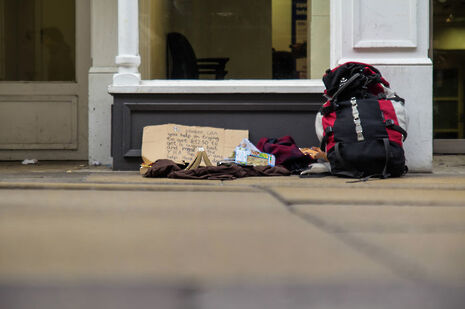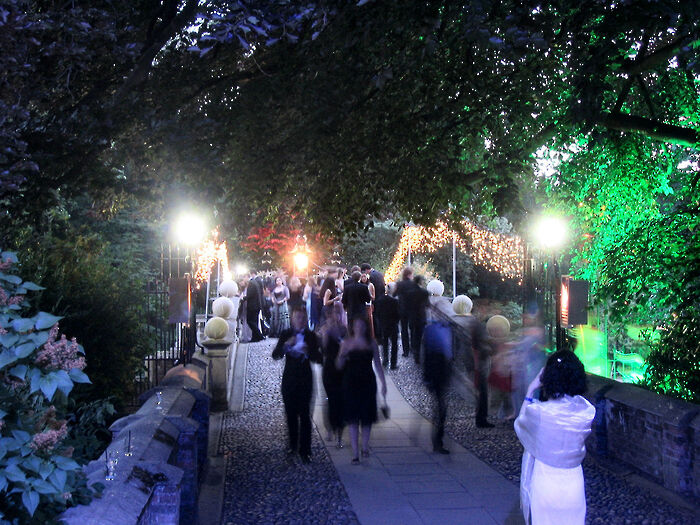Our mistreatment of homeless people is discriminatory and it needs to end
Will Davison argues that we need to work to end commonplace discrimination against homeless people

Homelessness is an uncomfortable and seemingly irresolvable issue. In Cambridge, every night, we watch people shivering in sleeping bags at the foot of beautiful buildings, whose crafted stone fronts hide warm, empty rooms. We walk past these scenes and feel guilty, but we allow social norms to prevent us from realising that we are a huge part of the problem. Our judgement of homeless people is discrimination, which we must realise and address.
Though we are reluctant to admit it, not many people trust the homeless. According to Crisis, 27% of homeless people report problematic drug and alcohol usage – and so we worry that any donations offered to a homeless person might be misused. But 27% is relatively low when compared to the stigma attached to homeless people – that the majority suffer drug and alcohol addictions. But if we compare this to 41% of students who report problematic alcohol use alone, it’s clear that our behaviour towards the homeless is an example of discrimination. For some reason, it is acceptable for students to spend government money (i.e. their student loans) on drugs and alcohol, yet when it comes to the homeless, we’re hesitant to help for fear of a minority of whom are victims of addiction. This needs to change.
The events doing the real damage are so commonplace and accepted that they don’t make the news
Being judged by one defining characteristic such as sexuality, gender or ethnicity is always painful and the same is true for homelessness. Homelessness not only provides immediate issues in safety, food security and health, but becomes a way for strangers to pass judgement. The prejudices inflicted on homeless people are particularly cruel and dehumanising, presuming them to be untrustworthy, dangerous and incompetent. Every time we walk past a homeless person, ignoring their pleas and tensely avoiding eye contact, we reinforce these viewpoints in our own eyes – and, most damagingly, in theirs. These judgements resemble the worst kinds of discrimination, which we are working so hard to abolish in other areas.
But with homelessness, we all allow prejudices to persist unchallenged. When looking for an example of mistreatment, the Cambridge student who burned a £20 note in front of a homeless man springs to mind. As horrific as this was, one off events like this are not the things causing the real damage. It is day in, day out disregard by ordinary people that erodes the confidence and happiness of homeless people. The events doing the real damage are so commonplace and accepted that they don’t make the news.
Cambridge rightly prides itself in its progressive attitudes. Combining this with the excesses of college accommodation, available funding, Cambridge’s public influence and high rates of homelessness (according to Shelter, there are 159 homeless people living in Cambridge), we are in the best possible position to initiate changes in the worldwide treatment of homeless people. Now is our opportunity to do so.
Until homeless people are accepted and valued as equals, we have no hope of a humane society
We worry that if we talk to homeless people, our guilt will only grow and make us help the person more than we had planned to. Offering someone a room to stay for the night is rare for hotels, rarer for colleges and unthinkable for individuals. We use these stereotypes to excuse ourselves from providing real charity. We won’t trust a homeless person enough to allow them into our home or to offer a generous amount of money, but these leaps of faith are readily made for all others. Students continually receive government loans and yet, in 2015, they spent four times more on alcohol than on food, according to one survey.
We allow one another to dehumanise homeless people. When offering “charity”, we call upon the law of diminishing marginal returns to justify our small gifts: it will mean a lot to someone who has nothing. This law is reasonable, but when have we ever applied the same law to feeling human? For someone who is perpetually avoided and mistrusted, treatment as an equal can be extremely valuable. In the podcast series ′Today in Focus’, Sharron Maasz, a homeless person who died in Oxford last year, offered advice to those who wish to help: “Don’t be judgemental. Buy them a coffee and just sit there.” She encouraged us to help a homeless person in the same way we would help a friend in a difficult situation. It might cost less than a handful of loose change but offering someone half your sandwich and sitting down to eat together can be worth so much to them and to you. Even just smiling at someone and looking them in the eyes is a huge step in the right direction. Until homeless people are accepted and valued as equals, we have no hope of a humane society.
In a society that is finally addressing the systemic discrimination that has been so harrowingly commonplace for centuries, it is of paramount importance that we broaden our own activism wherever we can, and we can do this by including homelessness in the discriminatory issues we address. We need to identify our individual presumptuous, socially-accepted mistreatments of homeless people and confront these societal flaws.
Crisis is a charity working towards effectively helping the homeless through political activism and the provision of expert advice, accommodation and food. Visit their website to find out more about how you can help the homeless. In Cambridge, the student-run organisation Streetbite distributes food to the homeless, making particular use of food that restaurants and shops would otherwise discard after closing time. For more information and to sign up for a fortnightly slot in the rota, visit the Streetbite Facebook page.
 News / Judge Business School advisor resigns over Epstein and Andrew links18 February 2026
News / Judge Business School advisor resigns over Epstein and Andrew links18 February 2026 News / Hundreds of Cambridge academics demand vote on fate of vet course20 February 2026
News / Hundreds of Cambridge academics demand vote on fate of vet course20 February 2026 News / Petition demands University reverse decision on vegan menu20 February 2026
News / Petition demands University reverse decision on vegan menu20 February 2026 News / CUCA members attend Reform rally in London20 February 2026
News / CUCA members attend Reform rally in London20 February 2026 News / Gov grants £36m to Cambridge supercomputer17 February 2026
News / Gov grants £36m to Cambridge supercomputer17 February 2026










